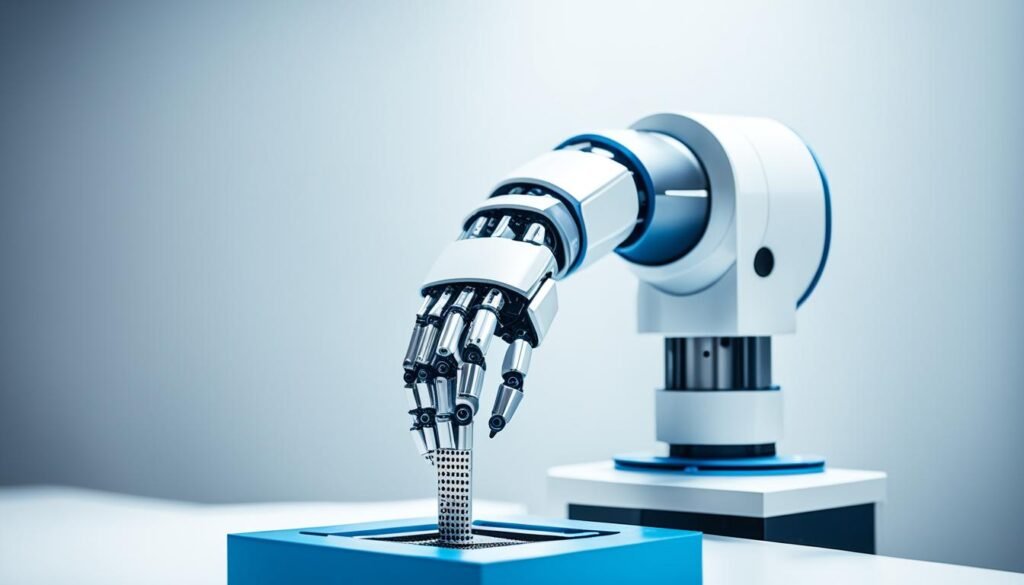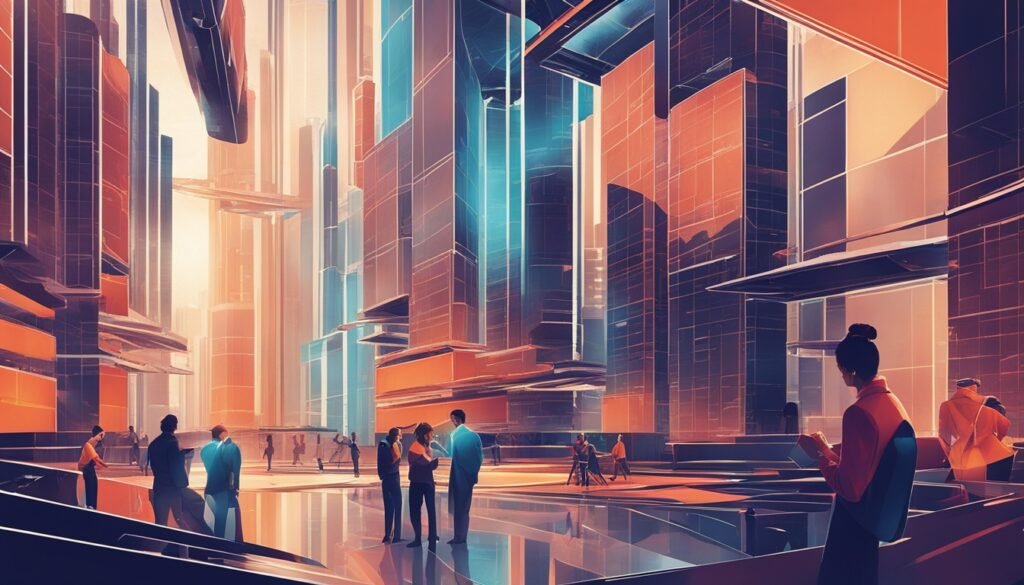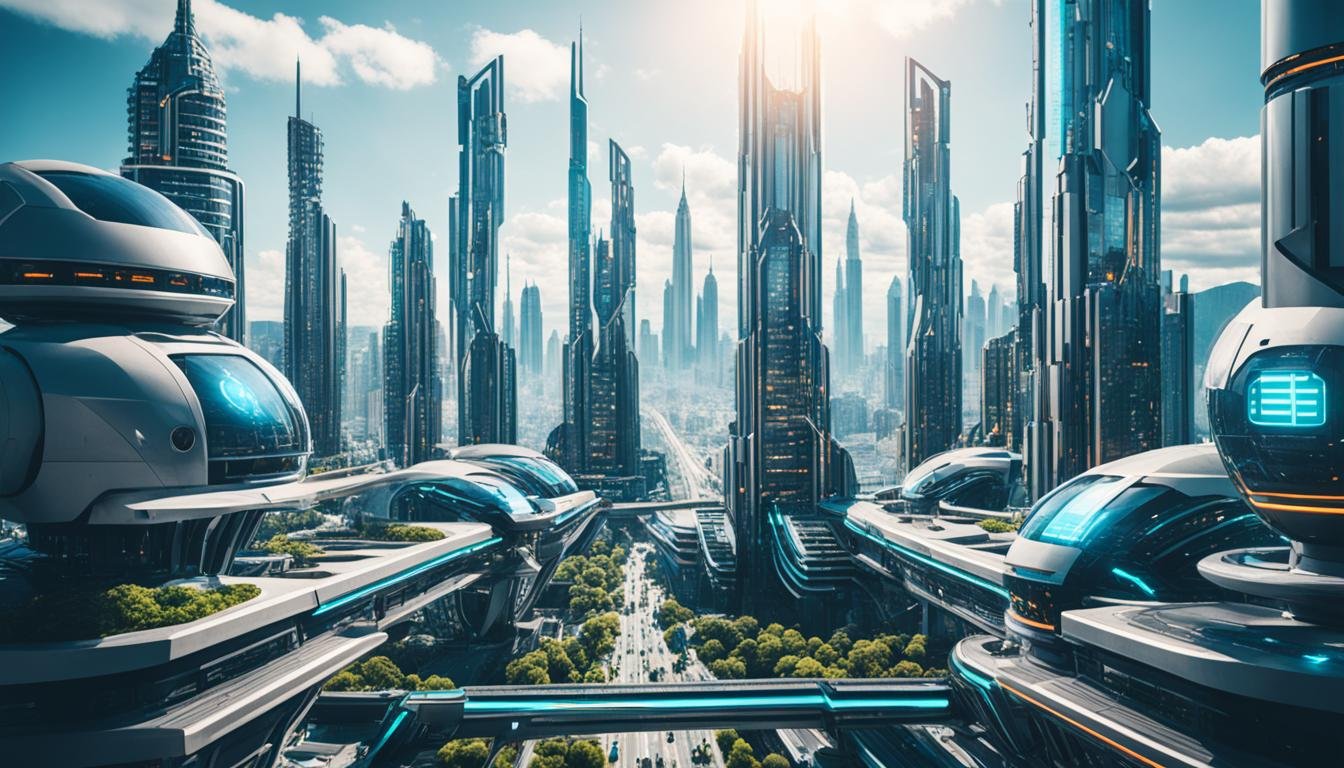A recent survey by Ourworldindata.org showed 352 AI experts think there’s a 50% chance of reaching artificial general intelligence (AGI) by 2061. They believe 90% of this will happen in the next 100 years. This makes us wonder: can AI really take over the job of software engineers in the future?
The idea of automation in software engineering has been around for a while. Many think we’ll see a future without programmers. But, the world is actually facing a shortage of skilled software workers. Big companies are struggling to find the right tools to automate their tasks.
AI and machine learning are getting more advanced, which makes us think about their impact on software engineering. New tools and techniques, like code generation and AI-powered debugging, could make making software faster and more efficient. But, can these tools really replace the human skills needed in software engineering, like creativity and problem-solving?
Key Takeaways
- The rise of generative AI, such as ChatGPT and DALL-E, has sparked discussions about the potential replacement of software engineers by AI.
- Experts predict a 50% chance of achieving artificial general intelligence (AGI) before 2061, with 90% expecting it within the next 100 years.
- While AI can automate certain repetitive tasks in software development, it is currently unable to replicate the human elements of creativity, critical thinking, and problem-solving needed in software engineering.
- Emerging AI tools are expected to enhance productivity and innovation in software development, but they are not seen as a complete replacement for human software engineers.
- The role of software engineers is likely to evolve towards tasks requiring higher levels of creativity, judgment, and innovation as AI technologies continue to advance.
The Rise of Generative AI and Its Implications
In recent years, AI has made huge strides, especially with generative AI. These models can make text, images, and more from what users ask for. ChatGPT by OpenAI is a top example, using transformer models and machine learning to make human-like content. But, this new tech also brings big challenges.
What Is Generative AI?
Generative AI means AI that can create new content like text, images, or music from prompts. These models learn from huge amounts of data to make new stuff that looks like the training data. This lets them make realistic and logical content, opening new doors in making content, art, and solving problems.
Challenges of Generative AI
Generative AI is growing fast but faces big hurdles. One big worry is how good and trustworthy the content is. Making sure AI content is accurate, true, and ethical is key, as it could be wrong, biased, or dangerous. Also, these models need a lot of computational resources, which is hard on the environment and resources.
Legal and ethical issues with generative AI are also tricky. Questions about who owns the content, privacy, and how it might replace jobs need careful thought. As generative AI gets more common, we need ongoing research and smart policies to handle these issues and make the most of this new tech.
| Key Statistic | Implication |
|---|---|
| 29% of software developers expressed concerns about being replaced by artificial intelligence | The rise of generative AI has sparked concerns among software developers about job displacement, underscoring the need for proactive strategies to address this challenge. |
| Researchers predict that by 2040, machine learning and natural language processing technologies will be capable of writing better software code faster than human developers | The rapid advancements in AI-driven software development suggest the potential for significant changes in the role and responsibilities of software engineers in the coming decades. |
| 55% of software engineers surveyed expressed concerns about the quality of AI-generated code | While generative AI holds promise, the quality and reliability of AI-generated code remain a concern among software professionals, highlighting the need for robust quality assurance measures. |
As generative AI keeps getting better, we need to tackle the challenges and see the chances it brings. By looking at the ethical, technical, and practical sides, we can use this tech to help software development, not just replace people.
Can AI Replace Software Engineers?
Limitations of Current AI in Software Development
Generative AI has made big strides, but it can’t fully replace software engineers yet. It can help with tasks like code generation, but it still needs human help. AI can’t make complex software projects alone and often needs humans to fix its mistakes.
AI also struggles with understanding context and making ethical choices, key for software engineering. It can boost productivity, but it won’t replace human creativity, problem-solving, and expertise anytime soon.
IBM’s Global AI Adoption Index 2022 shows 35% of businesses use AI. Also, 75% of top executives think AI will help their companies grow. Tools like DeepCode and GitHub Copilot are used in software development to improve code quality and find bugs.
AI’s benefits in coding, like better productivity and quality, come with challenges. Concerns include lack of creativity, dependency, and skill erosion, bias, and error amplification, and job displacement. Yet, human judgment and expertise are crucial in software engineering.

“AI cannot match human engineers’ abilities for invention and technology adaptability. It is unable to fully understand or handle complex and subjective aspects that skilled engineers manage.”
There’s a growing need for software engineers due to security threats. This means more investment in software that protects networks and infrastructure. The demand for developers, quality assurance analysts, and testers is expected to rise, showing the continued need for skilled software engineers in various fields.
Even with AI and automation, the demand for coding jobs is expected to increase. This highlights the ongoing need for skilled software engineers across industries. AI can improve productivity and efficiency, but it can’t replace human creativity, problem-solving, and ethical decision-making in software engineering.
The Potential of Artificial General Intelligence
The chase for artificial general intelligence (AGI) is exciting for the future of tech. AGI means machines that think like humans. They could do all the tasks humans do, changing the software world.
Experts think we might get AGI in the next hundred years, but it’s hard to say when. Making an AI as smart as us has been tough. The task of creating an AI like the human brain is huge.
AGI brings up big questions about ethics, society, and tech. We need to make sure these AI systems work with our values and don’t cause harm. As we move forward with AGI, we must see both its good and the big challenges.
| Potential Impacts of AGI | Ethical Considerations |
|---|---|
|
|
As we keep working on artificial general intelligence, it’s key for everyone to talk and work together. This includes software engineers, policymakers, and the public. We need to figure out how to use this new tech wisely.
Generative AI: A Powerful Tool, Not a Replacement
The world of software development is changing fast. Generative AI is making waves, but it’s important to see it as a tool, not a replacement for human skills. It can boost what software engineers do, but it’s not a full substitute.
Generative AI can’t yet match the problem-solving skills of human engineers. According to a recent study, large language models could only solve a small part of common software engineering problems. This shows it’s good at some tasks like writing code but struggles with the complex issues engineers deal with every day.
Human skills like creativity and making ethical choices are still key in software engineering. Sophie Berger said LLMs getting 5% right is essentially zero. AI can make some tasks easier, but people are still needed to check the work. They ensure the software meets user needs and is safe.
“LLMs struggle with solving cutting-edge or obscure problems in software context,” as per Maksym Fedoriaka from Applifting.
Generative AI can be a big help for software engineers. It can automate routine tasks, making engineers more productive. Joe Reeve of Amplitude believes engineers will use AI more for writing code, but still need to check the AI’s work. Yet, AI can’t solve all the complex problems engineers face.
In the end, generative AI is a game-changer for software development, but it’s not a replacement for human engineers. It’s a tool that helps them do their jobs better. Engineers will keep being crucial for creating strong, innovative software.
can ai replace software engineers
AI is changing the game in software development. It’s making the work of developers easier and more efficient. AI helps with everything from automating tasks to making code suggestions.
Automating Repetitive Tasks
AI is a big help in making routine tasks less of a burden. It can do things like generate code, test it automatically, and find bugs. This means developers can spend more time on the fun stuff, like solving complex problems.
Enhancing Developer Productivity
Tools like GitHub Copilot are already making developers work faster and better. They can even suggest whole lines of code, making the process quicker and less prone to mistakes. Companies are seeing their coding speed and quality go up thanks to these AI tools.
As AI gets better, it will change the software engineering world even more. It won’t replace software engineers, but it will make them better at what they do. They’ll be able to focus on the big ideas and use AI to make their work better.
“AI is already automating specific software development tasks such as generating code for repetitive functions, writing unit tests, and identifying bugs.”
AI’s role in software development will keep growing. By using AI tools, developers can make their work easier, faster, and more efficient. This means they can create better software, quicker.
The Benefits of AI-Assisted Software Development
Artificial intelligence (AI) is changing the way we make software. It helps create code faster and makes user experiences better. This technology is making software development faster and more productive.
Efficient Code Generation
AI helps write code quickly and accurately. It cuts down on the time it takes to make code and reduces mistakes. AI tools understand what the project needs and give code suggestions that save time and effort.
Enhanced User Experiences
AI does more than just write code. It also makes software more user-friendly. By studying how users behave, AI helps create software that meets their needs better. This leads to happier customers and more engagement.
AI also automates simple tasks, letting developers focus on the hard stuff. This boosts creativity and opens new possibilities in making software.
AI is changing software development for the better. As more companies use AI, we’ll see even more progress in the future.
| Benefits of AI-Assisted Software Development | Key Statistics |
|---|---|
| Efficient Code Generation |
|
| Enhanced User Experiences |
|
AI brings big benefits to software development. From making code faster to improving user experiences, AI is changing the game. As companies keep using this tech, the future of software looks bright and exciting.

Addressing the Concerns of AI in Software Engineering
AI in software development brings big chances but also big worries. One big worry is the fear of job displacement as AI takes over some tasks. But, AI can’t replace the human touch in software engineering. Humans bring creativity, problem-solving, and the ability to understand complex needs.
Using AI in software development also brings up ethical considerations like data privacy and algorithmic bias. Security vulnerabilities are another worry, as AI can be a target for hackers, making software more risky. These issues show we need to use AI wisely in software engineering.
Job Displacement Fears
AI tools like Devin help with coding, making some worry AI will replace developers. But, software engineers do more than code. They understand business needs, design interfaces, and make systems efficient. AI can do repetitive tasks, but humans are key for making decisions and developing software. The tech world has always changed with new tools and methods, not disappeared. Learning and adapting are crucial for software engineers, and those who learn to work with AI will be in demand.
Ethical and Security Considerations
Adding AI to software development brings up ethical worries like data privacy and bias. Security is also a big concern, as AI can be a target for hackers, putting software at risk. These issues highlight the need for careful use of AI in software engineering, keeping ethical and security standards high.
| Concern | Impact | Mitigation Strategies |
|---|---|---|
| Job Displacement Fears | AI automates certain coding tasks, leading to concerns about job loss for software engineers. | Emphasize the human-centric aspects of software engineering, such as problem-solving, creativity, and user experience design. Encourage continuous learning and adaptation to new technologies. |
| Ethical Considerations | AI-powered software systems may exhibit biases, privacy issues, and lack of accountability. | Implement ethical AI principles, such as transparency, fairness, and accountability, throughout the software development lifecycle. Ensure robust data governance and security measures. |
| Security Risks | AI systems can become targets for malicious activities, exposing software to new vulnerabilities. | Adopt a proactive approach to cybersecurity, with AI-powered tools for threat detection and mitigation. Continuously monitor and update security protocols. |
AI in software development offers big chances but we must tackle the worries about job loss, ethics, and security. Doing so is key for using this technology wisely in software engineering.
The Evolving Role of Software Engineers
AI is changing the game in software development, and software engineers are feeling the impact. They’re moving from just writing code to becoming architects and problem-solvers. AI helps them by automating simple tasks, letting them focus on harder and more creative work.
Now, software engineers work with AI to make development smoother and improve software quality. This change makes them key players in the industry. They work more closely with AI experts, using AI insights to make better decisions.
Some worry that AI will replace software engineers, but that’s not likely. Instead, their roles will change. They’ll keep being vital, learning to work with AI and shape the future of software development.
Jensen Huang, the CEO of Nvidia, believes software engineers might even see more demand. They’ll need skills in AI/ML, data engineering, and computer vision. To succeed, they must also be good at emotional intelligence, empathy, and communication.
Learning and adapting will be crucial for software engineers. The tech world is always changing. AI is not a replacement but a tool that makes them better at solving complex problems and innovating.

Companies need to support their software engineers as they evolve. This means providing resources and training. Offering challenges, mock interviews, and educational content can help create a culture of learning and growth.
AI might take over some tasks, but software engineers are still crucial. By using AI and updating their skills, they can take on new challenges. This will help shape the future of the industry and drive innovation.
Fostering Human-AI Collaboration in Software Development
As AI becomes more common in software development, it’s key to work together with human engineers and AI. This partnership uses AI’s power and efficiency. At the same time, it keeps human skills like creativity and problem-solving at the heart of the work.
Working together, humans and AI can make development faster, better, and more innovative. This way, AI helps improve the work of software engineers, not replace them.
The benefits of human-AI partnership in software development are many:
- AI helps write code and test it automatically, making development quicker. This lets developers focus on the tough and creative parts.
- AI-powered chatbots and analytics make the user experience better by offering personalized help.
- AI finds and fixes bugs, making software better and more reliable.
But, adding AI to software engineering also brings challenges. Concerns like job loss, ethical issues, and AI’s limits in understanding human needs need to be tackled. This requires good teamwork and ongoing learning for software engineers.
Creating a strong partnership between humans and AI is key to the future of software development. By working with AI, software engineers can keep up with changes and bring new ideas to the table. This will help them succeed in an AI-filled world.
“The role of software engineers is evolving to include effective collaboration with AI systems and the integration of AI technologies into solutions. Developers who adapt and upskill with AI-related knowledge will have better career prospects in the AI era.”
– Dr. Son Nguyen, Cofounder & CEO of Neurond AI
Conclusion
AI is changing the way we make software, but it’s not taking over human jobs. AI tools help make things faster and give us new insights. Yet, the human touch is still key.
Software engineering needs creativity and problem-solving skills. These are hard for AI to match right now. So, humans are still vital.
As AI gets better, software engineers will change too. They’ll move from just writing code to being problem-solvers. They’ll use AI as a powerful tool.
The future is about working together with AI. This partnership will bring new ideas, make things more efficient, and improve software. By embracing this change, engineers can lead the way in technology and open new doors.
AI and software engineering are becoming more connected. Engineers will need to use AI as a tool, not a replacement. This teamwork is key to making better, more innovative software.
FAQ
Can AI replace software engineers?
AI can make some tasks easier and automate them, but it can’t replace the human touch in software engineering. It lacks the creativity, problem-solving skills, and deep understanding of user needs needed for software development.
What is Generative AI?
Generative AI creates text, images, or other media from prompts. For example, ChatGPT uses language models to make content that seems human-made. But, it has issues like ensuring content quality and dealing with ethical and legal matters.
What are the limitations of current AI in software development?
AI tools help with code generation, but they still need human oversight. They can’t start complex projects alone and often need human review for errors. AI also can’t understand context or make ethical decisions like humans do.
What is Artificial General Intelligence (AGI)?
AGI means machines that think like humans. Getting to AGI is hard, and when it happens, it will change everything. It brings up big questions about ethics, society, and technology.
How can Generative AI be used in software development?
Generative AI can help software engineers by making tasks easier and more efficient. But, it’s not a replacement for them. It’s a tool that helps them focus on complex and creative tasks.
How is AI being integrated into software development?
AI is helping developers with tasks like writing code, testing, finding bugs, and improving user experiences. It automates routine tasks, letting developers focus on the hard and creative work.
What are the benefits of AI-assisted software development?
Using AI in software development has many advantages. It makes writing code faster, improves user experiences, automates tasks, and helps make decisions with data. AI can also create code snippets and analyze user behavior to make software more personalized.
What are the concerns about AI in software engineering?
Using AI in software development raises worries about job loss, ethical issues like data privacy and bias, and security risks. These issues highlight the need for careful use of AI in software engineering.
How will the role of software engineers evolve with AI?
As AI takes over routine tasks, software engineers will focus more on complex and innovative work. They’ll use AI to improve development and make better software. They’ll keep being key in the field, adapting to work with AI and shaping the industry’s future.
How can human-AI collaboration benefit software development?
Working together, human software engineers and AI systems can make development faster, better, and more innovative. This partnership ensures the human touch stays important in engineering, with AI helping to boost and enhance human skills.
